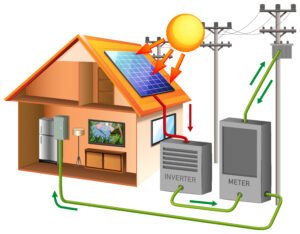Solar Grading and Net Metering:

Solar grading and net metering are related concepts in the context of solar energy systems. Let’s explore each term individually:
Solar Grading:
Definition:
Solar grading typically refers to the assessment or evaluation of the solar potential of a specific location. It involves analyzing various factors to determine how well-suited an area is for harnessing solar energy.
Factors considered in solar grading may include:
Solar Irradiance:
The amount of sunlight that reaches the Earth’s surface in a specific area
Shading:
The presence of obstacles, such as buildings or trees, that may cast shadows on solar panels.
Climate and Weather Patterns:
The local climate conditions affecting the efficiency of solar panels.
Topography:
The physical features of the land, which can impact sunlight exposure.
Net Metering:
Definition:
Net metering is a billing arrangement that allows solar energy system owners to receive credit for the excess electricity they generate and feed back into the grid. It is a crucial component of many solar energy policies and encourages the adoption of renewable energy technologies.
How Net Metering Works:
- When a solar energy system produces more electricity than the property consumes, the excess is fed into the grid.
- The utility company credits the solar system owner for the excess electricity at the same rate they would charge for supplying electricity.
- During periods of low solar generation (e.g., nighttime), the property draws electricity from the grid as usual.
- The customer pays only for the net electricity consumed, which is the difference between the electricity consumed and the excess electricity generated and fed into the grid.
Connection Between Solar Grading and Net Metering:
- Solar grading is relevant to determine the potential of a location for solar energy generation.
- A well-graded location with high solar potential is likely to benefit more from net metering, as it can generate surplus electricity to be fed back into the grid for credits.
Both solar grading and net metering contribute to the effective utilization of solar energy, with grading informing the decision on where to install solar panels, and net metering facilitating the integration of solar power into the existing electrical grid. These concepts play a significant role in promoting the adoption of sustainable and renewable energy sources.
